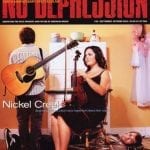Eric McConnell – Eight-track mind
From his front porch on Boscobel Street in East Nashville, cannot see the managers, publicists and record execs who inhabit the glass-walled office buildings and converted homes known as Music Row, where banners, painted bus stop benches and tattered handbills trumpet the successes of the Music City’s best-known industry like fraternity row during homecoming week.
Of course, they can’t see him either.
McConnell, a quiet, nearly shy, former high school decathlete, bought this house five years ago. Tall, thin, with truck-driver sideburns, glasses and a short ponytail, he’s suffered more broken bones than anyone this side of Evel Knievel. He taught himself steel guitar after breaking the two end fingers on each hand.
Without Loretta Lynn standing in the front yard in a brilliant blue evening dress, as she did for the cover of Van Lear Rose, you’d be hard-pressed to recognize that McConnell’s home is what’s pictured, that Lynn herself recorded inside. The Coal Miner’s Daughter, along with her newfound friend and producer Jack White, took up residence for ten days in September 2003. In February 2005 the resulting recording, without the benefit of country radio airplay, won two Grammys, including Best Country Album.
Asked if his phone traffic had increased since the awards show, McConnell says, “Not really. No.”
He refuses to put a name on his amalgam of recording equipment, musical instruments and knick-knacks, calling the studio “just a place.” From the outside, the structure looks like just another run-down house in yet another run-down neighborhood. Two full-throated canines, Rosa and Wilhelmina, guard the fenced-in, muddy yard.
On President’s Day 2005, guitarist Will Kimbrough, along with bassist Dave Jacques (pronounced Jakes) and drummer Paul Griffith, have moved in to cut basic tracks for Kimbrough’s long-overdue third solo album.
Jacques has been touring with John Prine for nearly ten years, and both he and Griffith played on Prine’s Fair And Square disc. Kimbrough’s been a little busy himself, touring with Rodney Crowell for nearly three years. In the preceding month and a half, Kimbrough also has produced Sweden’s alt-country Willy Clay Band and Adrienne Young’s sophomore effort The Art Of Virtue. Last summer he played guitar on Jimmy Buffett’s first country album, License To Chill; the Kimbrough-penned “Piece Of Work”, a duet with Buffett and uberpatriot Toby Keith, is that record’s current single. The publishing money from that Buffett cut is paying for these sessions.
Kimbrough is no stranger to McConnell’s house. Young’s first record was recorded here, and just over a year ago Kimbrough co-produced Todd Snider’s East Nashville Skyline in this same space. “The reason I came here,” Kimbrough says, “was to cut live. I just wanted to get everybody in there and just play. And we’re doing that. I had done that with Todd and I really like the sound. I like the one-inch tape and the eight-track. It sounds good. It sounds the way a lot of my favorite records were made.”
A first step into McConnell’s house yields an area holding amplifiers, guitars in cases, a black desk with an Apple computer. A long railroad room — in effect little more than a cluttered hallway stuffed with abandoned reel-to-reels, scrap lumber, cartons of albums, and an inaccessible washer and dryer — leads to the house’s only bathroom in the back right corner. To the left of the entryway is what passes for a control room. A mixing console takes up half the far wall. Racks of thin machinery with blinking lights and moving needles stand guard on either side. An upright bass leans in one corner, the tape machine in another. A musty green chair, a living room reclamation where a white-pantsuited Loretta Lynn was once photographed, is likely as not to hold a napping Wilhelmina. The black chow Rosa prefers the wood floor.
Kimbrough moves to a side parlor with an old stove and a couch filled with so many guitars that it’s impossible to sit. In a larger room, Griffith begins to set up his left-handed drum kit and Jacques plugs his bass into an amp head. In the kitchen, where a large beaker of milky coffee rattles in a beaten silver pot of boiling water, everyone but Kimbrough grabs a cup. “This guy,” Griffith says of McConnell, “makes the best coffee.”
The kitchen is also where Jacques records acoustic bass tracks. Cords are run underneath the door and held in place by a spherical iron shot put. Sometimes the floor creaks. Sometimes recording must wait until the aging refrigerator ceases its hum. On one tune, a large dumptruck shifted its rumbling gears on the adjacent side street just at the fade. Kimbrough kept the take.
“Loretta didn’t want to come in at first,” McConnell says. “I think she thought she was at the wrong place. I think she still thinks that.” But Todd Snider feels comfortable here. Asked to explain, he struggles for the right words. “It’s like,” he says, “I know that I like old records, but I don’t really know why.” On Snider’s East Nashville Skyline, as with Van Lear Rose, the Kimbrough sessions and every other recording project in his home, McConnell’s credit is limited to “Recorded by.” “We had him listed as engineer,” Snider says, “and he made us change it.”
“I’m not an engineer,” McConnell says. “An engineer wears a funny hat and drives a train.”




